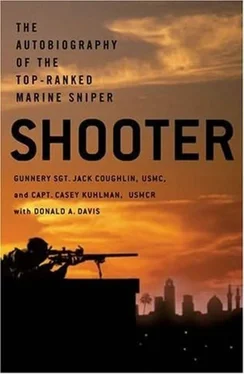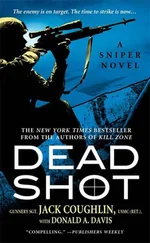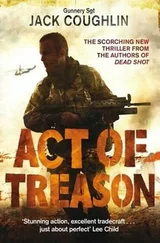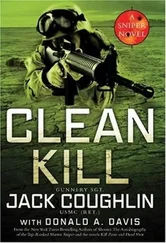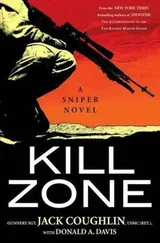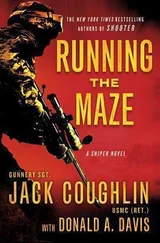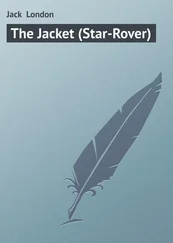His legacies to me were not vague ideas from academia though. They came from those hard years as a painter when he had postponed his teaching dream to support his family through sweat and toil. I was shown, not told, the workingman’s belief in hard labor, never giving up, valuing the family, and meeting your responsibilities. He was my hero.
I was not one of those aw-shucks country boys who learned to shoot before he learned to walk. My father did not even own a gun, and we never went hunting together. In fact, I never fired a rifle before joining the Marine Corps, and I still do not hunt animals. I am not against the sport; I just see no thrill, or challenge, in shooting an animal. Once you hunt men, nothing else can compare.
Growing up in an urban area taught me priceless street survival skills, and I learned how to be aggressive and protect myself at a young age. Some of the sternest lessons came from my sisters, who kept locking me out of the house when they were supposed to be babysitting me, because, they claimed, I was a pest. I used my outside time on sports and became a pretty fair athlete, with quick reflexes honed through hours of climbing trees and chasing balls and hockey pucks. When I looked up during a ball game, I would usually see at least one of my parents watching.
Coming home from school one day, I wandered into a rock fight between older kids, and a sharp stone smashed into my eye socket and knocked me unconscious. I awoke in the hospital, blind in my right eye because so many blood vessels had burst under the impact, and remained there for four days while the doctors decided whether surgery would be necessary. Each time the eye was tested, all I could see was the dark red color of my own blood.
Luckily, they chose not to cut. Instead, they put me on strict regimens that meant going to the eye doctor regularly for many years. As time passed, the eye not only repaired itself, but my vision kept improving until it surpassed normal and reached a level of 20/10. I can see perfectly today, and even better when I’m sighting through the scope of my rifle on a target a thousand yards away. After the severe damage to what would eventually become my “shooting” eye, it was only a quirk of fate that I could even qualify to be a sniper. There had been a good chance that I would be blind instead.
I returned to playing sports, and, like my dad with books, baseball was my own personal passion, the thing for which I lived. While pitching in high school, I conducted a real-world psychology experiment by messing with the minds of my opponents. Although my delivery was accurate, I cultivated the image of being a wild thrower and made a point of hitting a couple of batters in every game. When my best friend stepped up to bat for a rival team, I nailed him with the first pitch. If the batters worried about what I might do, they could not devote their full attention to their own purposes, so the fear that I might bonk them on the head gave me a clear advantage. I would later discover that the same sort of intimidation works on a battlefield.
My dream was to make it to the big show. Like so many dreams, it never materialized.
Pitching won me a full athletic scholarship to a major university, but the possibility of ever playing baseball in the major leagues was shattered during fall practice in my freshman year, when I hurt my pitching shoulder. It was the death of my boyhood dream and left me with an inner void where my purpose and goals in life should have been. I soon grew bored with being a mere student and determined that, unlike my father, academia was not for me. Math and science and English literature didn’t interest me. I needed a new path.
So when a friend suggested, “Let’s join the Marines,” I thought it was a great idea. I had never really considered military service, but maybe the Corps could furnish the teamwork and competitive excitement that had vanished from my life. Sands of Iwo Jima and all that. It was time to start a new dream, so we headed down to the recruiting station and told a bemused gunnery sergeant, “We want to go infantry, and we want to go now!” He handed us the papers with a smile. The year was 1985.1 was nineteen years old and on my way to Parris Island, South Carolina, for Marine boot camp.
After I’d endured the usual misfortunes that befall every Marine trainee, something interesting happened out on the rifle range, where we learned to use our M-16s. My barracks mates bragged about what good shots they were, how they grew up handling guns and could head-shoot a squirrel at a hundred yards, and I, knowing nothing about weapons, was in awe of their professed abilities. But once we hit the range, I discovered that shooting was easy! I could do it! When I pulled the trigger, I actually could see the vapor trail of the bullet leaving my rifle, and I received the top score in the platoon.
I was hooked on the military world, embraced life in the field, and was ticketed for coveted advanced training that only made me want more of the same. The Marines obliged, and I soon found myself attending Scout/Sniper School.
It takes more than good numbers on a rifle range to get into the school. Shooting, in fact, is only 25 percent of what a sniper does. Candidates are handpicked from among thousands of Marines, and even volunteers are not guaranteed acceptance. Every Marine is supposed to know how to shoot, and any fool can say, “I want to be a sniper,” but fools are not who we want.
Most of the candidates flunk out, so only the best make it through a grueling course that requires as much brain as brawn, because there is no such thing as a stupid sniper. The academic demands, from mathematics to botany, were harder than in any college classes I had taken and were only part of sixteen-hour days that also included backbreaking physical exercise. It was exactly what I wanted and needed at that point in my life, and I fit in there much better than I ever had at the university.
I grew steadily more comfortable with my rifle. It was a thrill every time we went to the shooting range, where I never had a bad day. Every time I pulled the trigger, every single time, I knew exactly what would happen, and even when I missed the bull’s-eye, I knew why. Nothing in my life, even throwing a ninety-mile-an-hour fastball, had ever given me such a feeling of being especially talented and confident, which drove me to gain even more knowledge and become even more accurate. Being a sniper soon became my life’s calling.
The scouting component was one of the most interesting courses I ever attended, better than survival schools, better than university classes, and even better than airborne training, for it was there that instructors taught me how to become invisible. I learned how to track my enemy and how to get up close enough to count the bad guys, determine how long they had been in the location, what they were doing, and what they were about to do. Once I had hunted them down, the job became how to remove or capture them. I learned to deal with physical discomfort and to accomplish my mission in rain, snow, desert wasteland, and triple canopy jungle where the vegetation was so thick that it was dark during the middle of the day. I was taught to get in, get close, kill quickly, and get out, without ever being seen.
As my skills developed, senior Marines who had been in the Corps longer than I had been alive took me, a young private first class, beneath their wings and became my private tutors in the secret arts of killing. There seemed to be nothing that these incredible guys could not do, and they coached me in how to go by the book and when to throw away the book and think for myself.
By the time I finished the sniper course, I had an instinctual feel for my rifle and knew how to precisely lead a target, which way he likely would turn in a given situation, how to make range estimates, and how to mathematically determine the effect that wind and weather have on a shot. Somehow, I didn’t need paper and pencil to solve the calculus, because I could almost sense what the bullet was going to do.
Читать дальше
